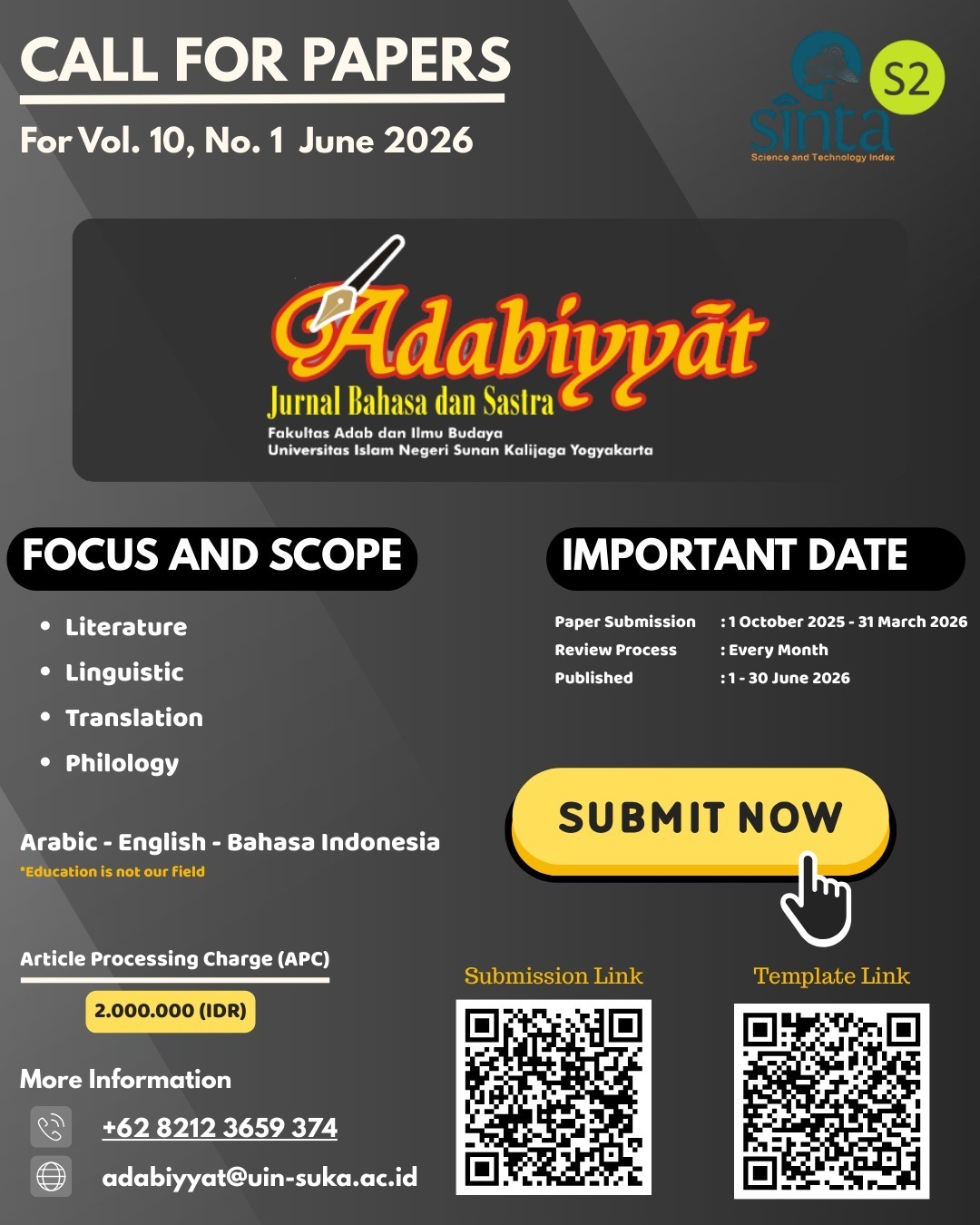SUBALTERNITAS TOKOH DIAH AYU DAN MAHARANI: ANTARA KUTUKAN DAN SENJATA
DOI:
https://doi.org/10.14421/ajbs.2021.05201Keywords:
subaltern, domination, representation, colonial, postcolonialAbstract
The story of “Kutukan Dapur” by Eka Kurniawan presents a colonial setting: Dutch colonialism and postcolonialism in the image of two characters, Diah Ayu and Maharani. Maharani is in patriarchal shackles, which is ingrained in her family life and social structure. Meanwhile, Diah Ayu is in the bonds of Dutch colonialism, which is brought back by the author. Both are in a subaltern position but in different conditions. Based on this description, this research asks two questions which are analyzed using Gayatri Spivak's subaltern theory, (1) what the position of Diah Ayu and Maharani in "Kutukan Dapur" short story, and (2) how the subaltern is constructed through the efforts of the two characters to get out of that position is. The method used is qualitative. The narratives are classified and analyzed to understand the subaltern's position and construction and its resistance efforts. This research indicates that Maharani and Diah Ayu are subalterns of Maharani dominated by patriarchy, while Diah Ayu is dominated by Dutch colonialism. Maharani fought back, but only with an idea or ideas. Unlike Diah Ayu, she is able to fight in a real form. However, as the author, Eka is trapped in a biased construction in addition to gender bias and representation. In subaltern studies, representation is only a tool towards more real domination. The two figures seem to be fighting against the power structure (colonial and patriarchal) but are still trapped in the dominance of the other.
Downloads
References
Ashcroft, Bill, Gareth Griffiths, dan Helen Tiffin. 1989. The Empire Writes Back: Theory and Practice in Post-colonial Lit. London: Routledge.
Bramantio, Bramantio. 2014. “Puitika Cerpen-Cerpen Eka Kurniawan.” MOZAIK HUMANIORA 14 (2): 8. https://doi.org/10.20473/ mozaik.v14i2.3846.
Faruk. 2018. Kajian-Kajian Pascakolonial, Ras, Ruang, dan Perjalanan. Yogyakarta: Dua enam Publishing.
Gandhi, Leela. 1998. Postcolonial Theory: A Critical Introduction. Sydney: Allen & Unwin 83 Alexandre Street.
———. 2014. Teori Poskolonial: Upaya Meruntuhkan Hegemoni Barat. Diterjemahkan oleh Yuwan Wahyutri dan Nur Hamidah. Jakarta: Qalam.
Geertz, Clifford. 1983. Keluarga Jawa. Jakarta: Grafiti Pers.
Kurniawan, Eka. 2018. Cinta tak Ada Mati dan Cerita-Cerita Lainnya. Jakarta: Gramedia Pustaka Utama.
Lestari, Erawati Dwi. 2020. “Relasi Pribumi dan Kolonialis dalam Cerpen ‘Kutukan Dapur’ Karya Eka Kurniawan (Tinjauan Postkolonial).” GHANCARAN: Jurnal Pendidikan Bahasa dan Sastra Indonesia 2 (1): 23–35. https://doi.org/10.19105/ghancaran. v2i1.3191.
Ramsi, Ida Satriyani Kasran, dan Else Liliani. 2019. “Social Criticism in a Short Story of ‘Corat-Coret Di Toilet’ by Eka Kurniawan.” Atlantis Press. https://doi.org/10.2991/icille-18.2019.33.
Rusdiarti, Suma Riella. 2019. “Dapur, Makanan, dan Resistensi Perempuan dalam Cerita Pendek Kutukan Dapur Karya Eka Kurniawan,” Desember. https://journal.unhas.ac.id/index.php/jib/article/view/7958.
Setiawan, Rahmat. 2020. Pascakolonial: Wacana, Teori, dan Aplikasi. Yogyakarta: Gambang.
Sharp, Joanne. 2008. Geographics of Postcolonialism. New York: SAGE Publications.
Spivak, Gayatri Chakravorty. 1995. “Can the Subaltern Speak?” Dalam The Postcolonial Studies Reader, disunting oleh Bill Ashcroft. London and New York: Routledge.
———. 1999. Critique of The Postcolonial Reason. Cambridge: Harvard University Press.
Downloads
Published
Issue
Section
License
- Adabiyyāt: Jurnal Bahasa dan Sastra publishes all articles entirely in full text.
- It is permissible for readers to download and to use it for scientific purposes and scientific dissemination.
- The author can re-publish the article that has been published by the Adabiyyāt: Jurnal Bahasa dan Sastra after obtaining written permission from the editor. This letter can be obtained by submitting a request letter for permission to republish the article to Adabiyyāt: Jurnal Bahasa dan Sastra via email adabiyyat@uin-suka.ac.id. In the second publication, the author is required to include information that the article was firstly published by the Adabiyyāt: Jurnal Bahasa dan Sastra.









